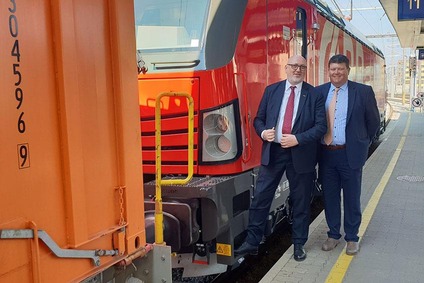
With the help of Rail Cargo Group, the Mollner Bau- und Rohstoffgruppe Bernegger has already shifted around 400,000 tonnes from road to rail every year. Both partners have achieved a positive balance following approximately three years of operation. But the cooperation was not only successful from a business perspective; the climate also breathed a sigh of relief. By transporting raw materials by rail instead of by truck, Berneggger has saved around 2,200 tonnes of CO2 annually, and has managed to save the greater Linz area 16,000 truck journeys per year.
“Using this measure, we aim to make our construction and raw materials group even more future-oriented and sustainable. In addition, the switch from road to rail provides a much higher degree of planning capability when it comes to transport to and from the site”, says Kurt Bernegger, managing partner of the Bernegger Building Group. More specifically, he is alluding to the congested Upper Austrian central area, which has dwindled to become a minor issue for his company thanks to the transport of raw materials by rail. In addition, Bernegger stressed the fact that the company had “freed itself from rising fuel costs”.
ÖBB push onwards with CO2 reduction
The project was made possible through cooperation with the Rail Cargo Group. The railway is one of the most environmentally friendly means of transport, meaning it is regarded as key in hitting the climate targets. Since July 2018, ÖBB has converted its traction power supply to entirely green electricity, making it one of the pioneers in Europe. From this year on, all railway stations, offices, workshops and container cranes are operated using renewable energy.
“Kurt Bernegger is a visionary, and as the head of a family business, he thinks in terms of generations. He sees the sustainable and future-oriented positioning of his company as crucial. This makes ÖBB the ideal partner”, says Andreas Matthä, CEO of ÖBB. Matthä adds, “One tonne of freight transported by rail results in 21 times less CO2 emissions than when it is transported by truck. RCG and its customers save the environment approximately 3.5 million tons of carbon dioxide each year. Railways can therefore make a significant contribution to achieving the climate goals. The Vectron locomotive is equipped with a highly efficient regenerative braking system in which the braking energy generated is converted back into electricity. This is fed back into the overhead contact line through the current collectors. Subsequent trains reuse this energy for the journeys they make”.
Bernegger invests millions into rail
From an economic point of view, Bernegger, the construction and raw materials entrepreneur, anticipates a long-term range of advantages: After all, Bernegger invested around EUR ten million in the Spittal am Pyhrn junction to construct a station with a 5-track connecting railway. From there, gravel is supplied primarily to concrete and asphalt plants in Linz and Enns, and building rubble from the Upper Austrian central area is returned to Spital a. Pyhrn for disposal on the way back. Bernegger initially purchased 80 private containers for this transport and another 50 in August 2018, meaning that three complete train sets are currently in use.
The operating costs of rail and truck are, however, comparable even without taking the investment into account. “We still see enormous potential here for switching from trucks to rail and would like more companies to follow our example”, says Bernegger. For him personally, the pinnacle has yet to be reached: Bernegger is currently taking around EUR 1.5 million from the port of Enns to create a direct train connection. A raw materials park is scheduled to be built here over the next few years. The company also invests in Linz: with investments of more than EUR three million, a plot of land is set to be developed by rail alone.

 Austria
Austria
 Hungary
Hungary
 Bosnia-Herzegovina
Bosnia-Herzegovina
 Bulgaria
Bulgaria
 China
China
 Germany
Germany
 Greece
Greece
 Italy
Italy
 Croatia
Croatia
 Poland
Poland
 Romania
Romania
 Russia
Russia
 Serbia
Serbia
 Slovakia
Slovakia
 Slovenia
Slovenia
 Czech Republic
Czech Republic
 Turkey
Turkey